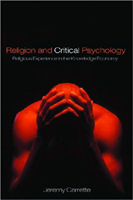 This is a response I wrote to Religion and Critical Psychology: Religious Experience in the Knowledge Economy (Routledge, 2007) by Jeremy Carrette, a Professor of Religious Studies at University of Kent, England. We just held a session on Jeremy’s book at the annual meeting of the American Academy of Religion in San Francisco, with additional responses from Ann Taves and Bonnie Miller-McLemore.
This is a response I wrote to Religion and Critical Psychology: Religious Experience in the Knowledge Economy (Routledge, 2007) by Jeremy Carrette, a Professor of Religious Studies at University of Kent, England. We just held a session on Jeremy’s book at the annual meeting of the American Academy of Religion in San Francisco, with additional responses from Ann Taves and Bonnie Miller-McLemore.
I have followed Jeremy Carrette’s writings for many years, and I regard him as the preeminent critical thinker in the psychology of religion. His professional mission is to question “how ideas are strategically excluded, privileged, and ordered within the scientific or humanities enterprise.” (viii) His notion of “disciplinary amnesia” highlights the tendency of scholars to ignore or mischaracterize earlier generations of research in order to legitimize their own efforts to answer the same questions. It’s really a more refined way of saying we continually reinvent the wheel (or, in a different register, that we’re trapped in an oedipal rivalry with our intellectual parents). Our lack of historical self-awareness prevents real progress from being made and casts unnecessary confusion over the whole enterprise of the psychology of religion.
The turn to economics in Jeremy’s new book opens up an important and long overdue realm of inquiry for researchers in the psychology of religion. He defines the “knowledge economy” as “the situation where knowledge (not information) becomes an economic good and where technology reframes how knowledge is both transmitted and used within the socio-economic order.” (x) Jeremy makes detailed and compelling analyses of several familiar figures (Maslow, Reich, Fromm) and argues that they suffer from “critical myopia” (13); they have failed to recognize the problematic interactions of their theories with the ethical and political order of the knowledge economy. What counts as “psychology” and what counts as “religion” in their theories is conditioned by, and unwittingly contributes to, the unjust economic regime of late capitalism. A key point is that “we under-theorize at the point that our values become evident” (93); that is, whenever we assert that a claim is basic, objective, universal, and non-theoretical, that’s exactly when our ethical values and our political will-to-power are making their totalizing move.
As always, Jeremy makes creative and highly effective use of William James. I appreciate the reminder, even if it comes from the other side of the Atlantic, that James’ ideas remain acutely relevant for present-day discussions in the psychology of religion.
This book is very dense and the tone is relentlessly judgmental. I don’t think those are problems per se, but they may limit the reach of Jeremy’s arguments. There is a lot of superego in this book; it speaks in the voice of an academic conscience, exposing errors and deceptions, scolding those who fail to uphold higher ideals of scholarship. It’s a heavy book, and I think it would benefit from a complementary spirit of levity, wit, and playfulness. It needs less Senex, and more Trickster. Foucault and Nietzsche, two of Jeremy’s intellectual heroes, were wonderful tricksters, and I miss that energy in this book.
For me the most anticipated chapter was the last one, on the cognitive science of religion, where I’ve been trying to make arguments informed by Jeremy’s work for some time. I felt a slight disappointment that he chose to focus on the writings of Harvey Whitehouse. Whitehouse is an influential and well-regarded figure, but in my own rogue’s gallery of wayward scholars in the cognitive science of religion I can think of more egregiously problematic people than him. Yet by the end of the chapter I appreciated Jeremy’s choice because he shows how the rhetoric of cognitive science has infiltrated Whitehouse’s work over the course of his writings, pushing out more nuanced arguments and inclining him, in some ways against his will, toward more simplistic positions. This rings true to me from the couple of times I’ve met and talked with Whitehouse. He seems ambivalent about his own model, belatedly recognizing how easy it is to over-concretize his concepts. I think Jeremy is exactly right when he says, “Cognitive concepts have a currency because they are the dominant ideological language of the market and they therefore flow through the social apparatus more easily.” (201) The concepts of cognitive science appeal to us because they fit so easily with our economic system and its treatment of humans as computational machines seeking to optimize our consumption behavior. Most of Whitehouse’s critics have said he applies cognitive science research inadequately, but Jeremy asks why did Whitehouse adopt this language in the first place? What does it get him? What are the economic, social, and political benefits he gains from using this language? These are the questions I’ve learned to ask myself, and maybe all of us should ask: What attracts us about cognitive science? Where do its concepts come into play in our work? What are we asking those concepts to do?
I also agree with a point that Jeremy makes only briefly, but to me has tremendous potential: “The cognitive science of religion requires more dynamic modeling of the mind to appreciate its own political involvement.” (167) I would add that a more dynamic modeling of the mind will lead to a better understanding of the mind itself and the actual evidence coming from contemporary cognitive science, evidence that does not support the simplistic claims about religion often made under this banner.
This leads to my biggest question for Jeremy is this: Can one be a critic and a scientist at the same time?
I don’t see him reference anyone who is both, i.e., a scholar who successfully combines the philosophical sophistication of a critic with the generative empiricism of a scientist. I’m not sure if Jeremy thinks a) the two are mutually exclusive, or b) they can potentially co-exist but no one has actually managed to hold them together.
I admit to an autobiographical interest in this question. In graduate school I was trained as a critic, and I developed good skills at analyzing the psychological and political assumptions underlying theories in my specific field, the study of dreams. But I soon reached a point where I had to ask: Now what? Do I sit back and wait for more theories to appear so I can critically scrutinize them (and invariably find them pitifully inadequate)? Or do I roll up my sleeves and do some empirical research of my own, using the critical awareness I’ve learned from Jeremy to design projects and generate new data that will compel my scientific colleagues to change their theories, not because Jeremy and Foucault say they should but because there’s new evidence they have to take into account?
Let me emphasize this point by closing on a note of mythological whimsy. Jeremy’s book makes me think of the Trojan War. The Greeks are the forces of critique, and the Trojans are the scientists holding the truth captive within their mighty walls. The conflict between the two armies seems like it will go on forever. In this AAR version of Homer’s epic I cast Jeremy in the role of Achilles, the indomitable Greek warrior who can defeat any Trojan in single combat. But no matter how many Trojans he slays and drags around the battlefield, he cannot by force of arms alone breach the city walls. For that, I believe he needs the trickster spirit of Odysseus to create something the Trojans value, something that appeals to them and persuades them to unlock their gates. Once you’re inside the gates, then you can come out and do your transformative critique, your conceptually disruptive mischief, your dynamic consciousness-raising, your humanistic liberation of the truth. A Trojan Horse strategy has the potential to overcome the sterile clash of arms and lead to a more fruitful interaction between scientific psychology and the study of religion.
Kelly Bulkeley
The Graduate Theological Union
November 20, 2011
Note: Jeremy wrote a great chapter on cognitive neuroscience in a book I edited a few years ago, Soul, Psyche, Brain: New Directions in the Study of Religion and Brain-Mind Science (Palgrave, 2005)
